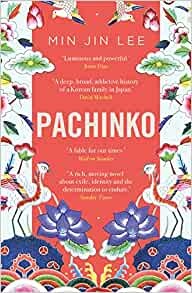
Book review: Pachinko, Min Jin Lee
Pachinko, Min Jin Lee.
Yeongdo, Korea 1911.
In a small fishing village on the banks of the East Sea, a club-footed, cleft-lipped man marries a fifteen-year-old girl. The couple have one child, their beloved daughter Sunja. When Sunja falls pregnant by a married yakuza, the family face ruin. But then Isak, a Christian minister, offers her a chance of salvation: a new life in Japan as his wife.
Following a man she barely knows to a hostile country in which she has no friends, no home, and whose language she cannot speak, Sunja’s salvation is just the beginning of her story.
Through eight decades and four generations, Pachinko is an epic tale of family, identity, love, death and survival.
What’s good about it?
Pachinko is a book that’s as colourful and rich as its beautifully illustrated cover. Its warm prose is addictive and spellbinding and had me immersed from the outset.
At 480 pages it’s one hefty work of fiction, but at no point during reading did it feel onerous. Author Min Jin Lee first had the idea for Pachinko back in 1989, and the care and meticulous attention to detail that’s gone into researching and developing this story is clear. It’s not only a brilliant yet frequently harsh and heartbreaking tale, but also highly educational and informative - always a bonus! As someone whose knowledge of the complex historical relationship between Korea and Japan was limited to say the least, I learned a lot from this book and I’d now like to know even more. At the time of writing this review, it’s also incredibly topical.
Pachinko spans almost 100 years, and in that time we follow the novel’s protagonist, Sunja and several generations of her family, on an emotional and physical journey from rural Korea to various locations in Japan. It’s told in chronological order, and flows with a steady pace through contrasting eras and different perspectives. It ends in 1989 with Sunja’s grandson Solomon considering his next career move.
Sunja is born the only daughter of Hoonie and Yanjin and enjoys a simple and relatively untroubled childhood helping her doting parents to run a boarding house. Through chance encounters, Sunja’s innocence is lost and her life changes forever. Meeting and falling for Koh Hansu, a married and much older yakuza, results in Sunya’s unwanted pregnancy and subsequent relocation for a new life in Japan. Despite being ‘rescued’ by Isak, a kind but sickly Christian minister who agrees to marry her, it’s her move to Japan that signifies the start of her life of hardship and unending feelings of shame and guilt.
Pachinko explores robust themes of family, identity and resilience and vividly portrays the harsh existence of Korean immigrants living in a far from welcoming Japan. Sunja and her family experience racism, prejudice and brutal inequality. At times this makes Pachinko a difficult read, but pride and the warmth and love of the multi-generational family connections shines from every page.
The core characters are memorable, well-formed and the females especially strong and selfless. Sunja and her sister-in-law Kyunghee quickly form an enduring bond and strive to do the best for their families in the face of immeasurable adversity. We see them working their hands raw to keep a clean and respectful home, we see them selling homemade wares from market stalls for a pittance and making continual sacrifices without complaint in a battle for a better life.
The male characters are multifaceted and fascinating. Sunja’s two sons - thoughtful and fiercely proud Noa, is plagued throughout his life by his struggles to fit in, and with being an outsider - a Korean in Japan. His younger brother Mozasu is perhaps the most likeable character of all - facing tragedies of his own but choosing to deal with things more openly.
The popular game of pachinko - a type of pinball - gives the novel its name. The shady crime-associated parlours from which it’s played, touch the lives of characters throughout, with both Noa and Mozasu managing pachinko parlours at different points in the story. As a game of chance, it comes to symbolise the twists and turns, and gambles taken by the book’s characters, some of which pay off, some of which lead to hopeless dead ends.
What’s not so good?
I got totally lost in this epic tale and it was a genuine pleasure to read. If I had to pick a negative I’d say there were too many characters which could at times make the story a challenge to follow. Some of the ancillary characters, such as Solomon’s brief dalliance Hana, made only fleeting appearances and so perhaps didn’t warrant the level of description afforded to them. I’d have preferred more time with the central characters. Other than that, I can’t fault Pachinko, it’s an excellent story and history lesson rolled into one.

Post a comment